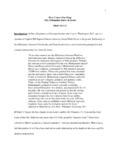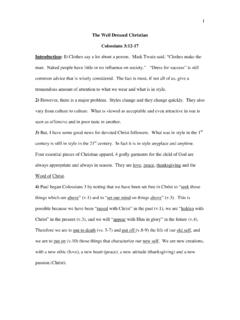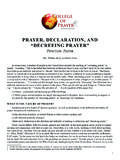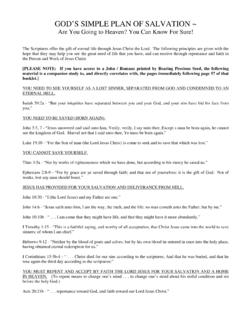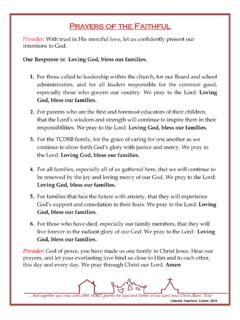Transcription of Daniel 9.1-19, Lessons On Prayer From A Man Of God ...
1 1 Lessons On Prayer From A Man Of God Daniel 9:1-19 Introduction: 1) The wonderful 17th century Puritan, John Owen, well said, What an individual is in secret, on his knees before God, that he is and no more (quoted, in Ferguson, Daniel , 171). If Owen is right, and I believe he is, then Daniel was quite a man. This is certainly what God thought. In 9:23 the angel Gabriel says of the prophet, you are treasured by God. The ESV translates it, you are greatly loved. The NIV, you are highly esteemed. 2) Daniel 9:1-19 contains one of the most remarkable prayers in all the Bible. It runs on the dual tracks of 1) corporate confession of sin and 2) recognition of the greatness, awesomeness, righteousness and holiness of God as expressions of His character. It is a model Prayer for how God s people should pray for a nation to be sure.
2 But even more, it is a model for how God s people should pray for a desolate and rebellious community of faith. This is God s man confessing and interceding for God s sinful people! 3) The brokenness and humility of Daniel as he prays for all Israel ( ) is amazing. And yet, we should not be surprised. As the faithful Baptist preacher of London, Charles Spurgeon, said, A True-Hearted believer does not live for himself. Where there is abundance of grace, a great strength of mind in the service 2 of God, there is sure to be a spirit of s Prayer should, by the blessing of God s Spirit, inspire us with the spirit of Prayer ; and that his example, in forgetting himself, and remembering his people, should help us to be unselfish, and lead us to care for our people even God s people to whom we have the honor and privilege to belong (Spurgeon, Sermons on the Book of Daniel , 99-100).
3 4) We are going to look at this Prayer in four movements: 1-2, 3, 9-14, and 15-19. And, we will bracket each movement with great statements on Prayer from precious saints who delighted in talking to our heavenly Father in Prayer . So, I want us to just immerse ourselves in the purifying waters of Prayer asking God to make us men and women of Prayer like we see exemplified in his prophet named Daniel . I. Let your prayers flow from your study of the Scriptures 9:1-2 Don t pray when you feel like it. Have an appointment with the Lord and keep it. (Corrie Ten Boom) Daniel provides a historical marker for us in verse 1: it was the first year of Darius the Mede (another name or title for Cyrus; cf. 5:31; 6:1). The date is c. 538 , approximately 12 years after the vision recorded in chapter 8 (Miller, Daniel , NAC, 240).
4 Daniel is now more than 80 years old. He outlived the Babylonian empire and now serves under Medo-Persia. 3 Daniel is reading the Bible, the books according to the word of the Lord. (v. 2). Specifically, he is reading the prophet Jeremiah that the number of years for the desolation of Jerusalem would be 70. This predictive promise is found in Jeremiah 25:1-14 and 29:1-11. Don t miss the important point that Daniel considered Jeremiah to be Scripture in calling it the books or literally the writings (Heb. separim). The Hebrew canon was not complete, but Jeremiah was already a part of sacred Scripture. God judged Israel as He promised He would in Deuteronomy 28:15-68. Jeremiah reveals this exile would last 70 years. Daniel was exiled with others in 605 (cf. Dan. 1:1-4). It is now 538 Daniel , in reading Jeremiah, knows the end of God s judgment of exile on His people is coming to an end.
5 And, he knows that Yahweh (LORD, vs. 2, 4) is a covenant God who keeps his Word (cf. also Ezra 1:1). Further, as Bob Fyall succinctly says, What Scripture says is what God says, and what God says happens ( Daniel , 132). When God makes a promise in his Word, it is not conditional or potential. It will come to pass just as He says it will. No other god can do that because all other gods are mere idols often empowered and energized by demons. Isaiah 44:6-20 contains a scathing denouncement on them and those who make and worship them. 4 Daniel , as should we, believed in predictive prophecy. He saw it as he read and mediated on Scripture and trusted it as a reliable Word from God. Exiled, captive in a godless land, moving rapidly toward the end of his life, he still had great hope for his people in light of the sure and certain promises of the Word of God.
6 Confidence in the promises of God did not move him to complacency. They drove him to action and to his knees. Immersion in Scripture will be an energizer to Prayer ! So, reflecting on these two verses we would all do well to ask: do I struggle to pray as I ought because I do not know Scripture as I should? Do I fail to approach my God well because I do not soak in His Word well? God delights in the prayers of his children that emerge out of time in his Word. Only as we deepen our understanding of God as revealed in the Bible will our praying become richer and more soundly based on who God is (Bob Fyall, Daniel , 147). II. Let your prayers humbly take you into the presence of God 9:3 Where the mind isn t brimming with the Bible, the heart is not generally brimming with Prayer (John Piper) 1) Verse 3 describes the humble and contrite attitude which Daniel approached the Lord God in Prayer .
7 He began by turning from his reading of the 5 Scriptures to the face of the Lord my God (vs. 4). Ren P ter-Contesse and John Ellington note that in the context of Bible translation, a literal rendering of the verb phrase turned my face will probably sound strange in many languages. It simply focuses on the beginning of the action of earnestly praying to God (A Handbook on the Book of Daniel , UBS Handbooks Series, 231). There is a deep earnestness in Daniel s heart that moves him to look to his Lord. Seeking the Lord by prayers and pleas for mercy (ESV), he approaches Him in the 3-fold posture of fasting, sackcloth, and ashes. David Helm provides a nice summary when he writes, Fasting is the withholding of food from the body for the sake of prioritizing something else, such as Prayer . Sackcloth was a rough material, most likely made from animal skins, that would have been an irritant to the skin, and was a mark of repentance, Ashes symbolized complete ruin.
8 In other words, the posture of Daniel took was of visible lament ( Daniel for You, 159). Daniel turned to the Lord with a heavy heart, a burden he could hardly bear. Indeed he could not bear it without God s help and strength. Daniel s Prayer should remind us of a Prayer offered in a garden called Gethsemane some 600 years later. In Gethsemane, in prayers and petitions, our Lord Jesus turned His face to his Father in humble pleas for mercy (Luke 22). The burden of bearing the sins of the world (John 1:29) caused His sweat [to become] like drops of 6 blood failing to the ground (24:44). Coming humbly, dependently, into the presence of His Father, His Prayer was heard ( not My will, but yours be done ) and strength was provided for enduring the cross that lay ahead. Daniel humbled himself to pray. Jesus humbled Himself to both pray and to prepare for His passion.
9 It is truly unconscionable that we would ever think to burst into God s presence in arrogance or pride, in hubris or vain glory. When we know our sin and the sins of our people, we will approach our God on our knees and with our face to the ground. Only then can we turn our face to the Lord with our prayers and pleas. Only then can we rightly pour out our heart and soul to the Lord my God. All vital Prayer makes a drain on a man s vitality. True intercession is a sacrifice, a bleeding sacrifice. (J. H. Jowett). III. Let your prayers be characterized by honest and full confession of sin 9:4-14 The great people of the earth today are people who pray, (not) those who talk about Prayer . (S. D. Gordon) The Prayer of Daniel is recorded in verses 4-19. It is characterized by 2 major themes: 1) cooperate confession of sin and 2) acknowledgement of God s character and mighty acts of salvation.
10 John Piper notes, Daniel s 7 Prayer begins with the Bible and it is saturated with the Bible. Phrase after phrase comes right out of Scripture. There are allusions to Leviticus (26:40) and Deuteronomy (28:64) and Exodus (34:6) and Psalms (44:14) and Jeremiah (25:11). The Prayer brims with a biblical view of reality, because it brims with the Bible ( How to Pray for a Desolate Church, 1-5-92). The Prayer itself can be analyzed in a number of ways including its structure and its content. Structurally there are three movements: 1) Adoration ( ) 2) Confession (vs. 5-14) 3) Petition (vs. 15-19) (Miller, Daniel , 243-249). In terms of content one is overwhelmed by the use of the word we and the piling up of terms used to describe Israel and Judah s sin. Concerning the use of we and Daniel s solidarity with the Hebrews in their sin, Bryan Chapell well says, Daniel confesses the reality of his sin and the people s sin because he has been called to carry their burden as his own even though he did not cause the burden.

